Is your overthinking brain keeping you up at night? We’ve all been there. Anxiety and stress creep in, you lie awake at night tossing and turning and worrying. You get up in the morning feeling like you have been hit by a truck and you are more tired, anxious and stressed because of it. It is a vicious cycle. Bottom line is, sleep is so integral to your body and hormones functioning correctly, if it is disrupted you will feel it.
This blog is brought to you by the team at Real Active and Naturopath Alana Howarth from MK Natural Health to get her top tips on improving your sleep.

- START YOUR DAY WITH SOME SUNLIGHT EXPOSURE
Sunlight exposure results in our bodies making vitamin D, the sunshine vitamin. Vitamin D is involved in the pathways that help us make our sleep hormone, melatonin. Melatonin is released in response to darkness and is responsible for regulating our sleep-wake cycle, aiding us in getting to sleep faster at night. Aim for 15-30mins of sun exposure between 7-10am on your thighs, stomach or through the eyes (try to go without sunglasses if you can!). Remember outside of this to always practice sun safe exposure.

- STAY HYDRATED DURING THE DAY
This is often an overlooked tip when it comes to improving our sleep. If you aren’t consuming enough water during the day, you’re likely to experience more daytime sleepiness than if you were hydrated. This is due to many reasons, but one being a drop in blood pressure. This can trick us into thinking we may have had a worse night’s sleep the night before than we actually did; it might even lead us to needing to nap during the day. This will then affect your circadian rhythm by pushing back your bedtime to later than normal, making it harder to fall asleep. Aim for 1.5-3L per day depending on exercise output.

- MOVE YOUR BODY
Not only is it great to get outside and connect with nature, but research has also shown that regular moderate exercise can assist in reducing the amount of time it takes to get to sleep, increase sleep duration and improve sleep quality. It is recommended to try and move your body for 20-30mins daily. However, keep in mind not to exercise too close to bedtime. Aim for no later than 2-3hrs before you aim to go to sleep.
- HAVE A REGULAR SLEEP SCHEDULE
Sorry, Mums, we know this isn’t very realistic for you but your circadian-rhythm or your sleep-wake cycle depends on timing. So, when it comes to wanting to fall asleep quickly, and easily, nourish your internal body clock by giving it a schedule to stick to.
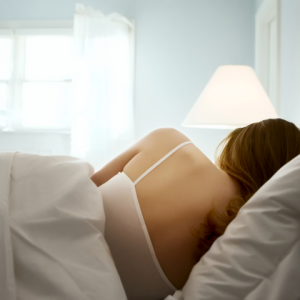
- AVOID CAFFEINE TOO LATE IN THE DAY
Try to reduce your intake of caffeine over the day and aim to have your last caffeinated beverage no later than 2pm. As we all know, caffeine can be a lifesaver and keep us alert when we really feel like we’re completely dead inside, however, the catch here is that caffeine will increase our stress hormones which can increase our feelings of anxiety and make it harder for us to get a good night’s sleep. It may feel like torture to begin with but reducing your caffeine intake will assist you in getting better quality sleep. The result is needing less caffeine! Win, win!

- PRACTICE JOURNALING
If you’re having trouble falling asleep due to an overactive mind, journaling might be a great solution for you. Creating a relaxing routine around this is a great way to rewire your brain into knowing once you’re done journaling, it is time for sleep. Grab a cup of calming herbal tea, have your journal beside your bed, dim the lights and start writing. Get everything out of your brain that you need to. It doesn’t need to make sense and it doesn’t need to be perfectly curated. Once you’re finished, don’t read over it, close the journal, and take some deep belly breaths. Know that you have now processed what you need to for the day, and you are now ready for sleep. Calming teas include – chamomile, lavender, valerian, hops & lemon balm.
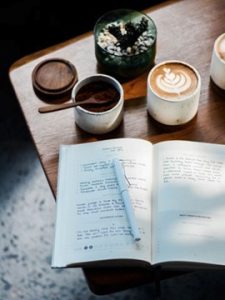
- ADD ESSENTIAL OILS
In addition to the above, burning some essential oils during your sleep routine can signal our brains that it is time to wind down. One study showed an improvement in deep sleep after exposure to lavender oil before bed.
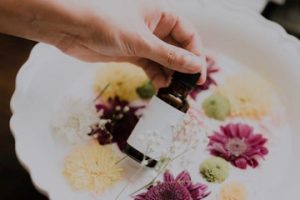
- UNPLUG
Reduce your device use 1-2 hours before your target bedtime. This reduces your exposure to blue light, which reduces your melatonin production. As melatonin is a hormone that is produced in response to darkness, our phones, televisions, and computers can trick our brains into thinking it’s still daytime due to the blue light they emit. This can then reduce or inhibit our natural melatonin production leading to later bedtimes, issues with sleep onset and reduced sleep duration.
- MEDITATE
This can mean something different for everyone. For me, it’s going to bed with a good book and listening to some sleep music. It allows my brain to focus solely on the words on the page, without intrusive and wandering thoughts. Meditation can also mean listening to a guided meditation or simply laying still and listening to some meditation music. The idea is to allow your mind to relax and to give it a break from the day’s thoughts.
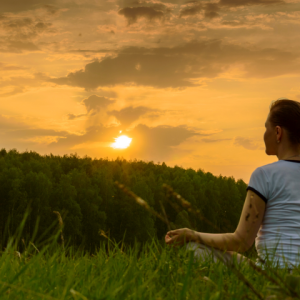
- TRY WHITE NOISE
This is similar to the above, but a little more specific. If you find that a quiet room allows your brain to run wild with thoughts at bedtime, or if you like to fall asleep with the TV on for some background noise, some white noise might be perfect for you. Download the app Insight Timer or jump onto YouTube. Whether you like to listen to a storm rolling in, crashing waves or some calming music, there is something available for everyone.
- REDUCE ALCOHOL INTAKE
Having some wine after work or dinner might help you feel a little drowsy and ready for bed, but alcohol has shown to interrupt REM and NREM sleep. It has shown to increase sympathetic nervous system activity and cause sleep disruption especially during the second half of the night (when our deepest sleep occurs).
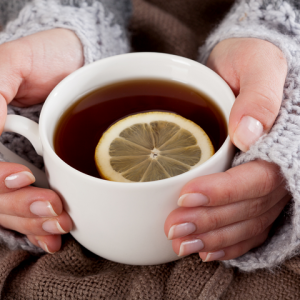
- TRY MAGNESIUM GLYCINATE
This form of magnesium decreases cortisol levels, increases natural melatonin levels, and activates our GABA receptors in the brain leading to a calmer and less interrupted deep sleep.
- SEE A PRACTITIONER
If sleep and fatigue are becoming a problem for you, please reach out and see a qualified practitioner. My job as a Naturopath is to investigate what’s happening for you as an individual through a series of in-depth questions ranging from medical history, current personal history, right back to childhood health. My aim is for you to feel heard and to get to the bottom of your symptoms so we can achieve longer lasting results and a better quality of life.
For more blogs like this, visit Real Active’s website or Instagram.


Crunch Fitness Virtual Assistant
 I'd like some help reaching my Fitness goals!
I'd like some help reaching my Fitness goals! I'm an existing member and would like some help!
I'm an existing member and would like some help! I have some questions about becoming a Crunch member!
I have some questions about becoming a Crunch member! AU
AU United States
United States Canada
Canada Costa Rica
Costa Rica Spain
Spain Portugal
Portugal NSW Clubs
NSW Clubs VIC Clubs
VIC Clubs